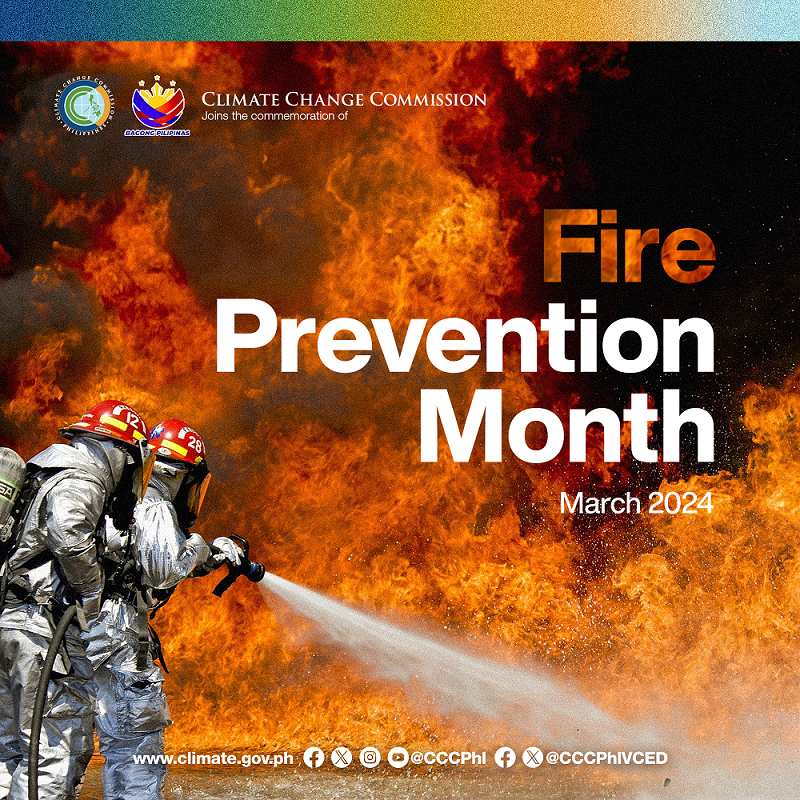
March 15, 2024 Friday

MANILA, 15 March 2024 – The Climate Change Commission urged the public to take preventive measures against urban and forest fires exacerbated by the ongoing El Niño.
According to the Bureau of Fire Protection, the combination of heat and the absence of moisture effectively dries up most materials, making them more vulnerable to sparking widespread fires that cause significant losses to lives and livelihoods.
As of March 5, 2024, a total of 3,200 fire incidents were recorded nationwide, marking a 26% increase compared to approximately 2,539 occurrences during the same period last year, according to BFP Director Louie Puracan.
He also shared that the 2024 fires have already claimed 70 lives — representing a 37.25% rise from the 51 lives lost in fires that occurred in 2023 around the same quarter. Similarly, this year’s fires have resulted in an estimated P2.33 billion loss and damage to property, indicating a 59.6% increase compared to the P1.46 billion during the same period last year.
The BFP tagged El Niño as a significant contributor to the fires, especially wildfires and forest fires, citing the current wildfires unfolding in the Cordillera Region as an example.
“Isa pa ring challenge natin ngayon ay yung El Niño. Nakikita po natin sa news, na particularly sa Cordillera area, we have recorded 72 fire incidents na,” said Puracan.
Meanwhile, Department of Interior and Local Government Secretary Benhur Abalos tracked some forest fires to root from embers left out by campers in the wild. Given this, he encouraged the masses to be responsible and ensure that the fires they start during camping be securely put-out.
“Let’s be responsible for our actions kase minsan, yung mga naiwan na pinagsawaan nilang apoy dun nagsisimulang lumiliyab at ang daming mga kahoy ngayon ang talagang tuyo. Ang problema natin sa bushfire, ang hirap patayin nito, lalo’t gubat ang sinusunog niya,” Abalos said.
The CCC emphasized the importance of preemptive measures against fires during the intensified dry season. The Commission shares methods to prevent fires during this period, rallying the Filipino people to fireproof their properties, practice safe and responsible cooking at all times, and prepare for fire emergencies.
Recognizing the risks associated with climate-induced phenomena like El Niño, the CCC, in partnership with other national government agencies, has crafted policies and strategies that prepare the nation for climate-related impacts and disasters. These strategies are outlined in the National Climate Change Action Plan (NCCAP) and the National Climate Risk Management Framework (NCRMF).
Similarly, the draft National Adaptation Plan (NAP) serves as a blueprint for initiatives aimed at enhancing resilience at both sectoral and community levels against the impacts of climate change. It prioritizes eight sectors requiring urgent interventions: agriculture, fisheries, and food security; water resources; health; ecosystems and biodiversity; cultural heritage, population displacement, and migration; land use and human settlements; livelihood and industries; energy, transport, and communication.
“Implementing the strategies and recommendations outlined in these policies and frameworks strengthens our adaptive capacity to face climate risks such as El Niño, ultimately leading to more climate-resilient communities,” said CCC Vice Chairperson and Executive Director Robert E.A. Borje.
PAGASA has issued a warning about the onset of a severe El Niño event this month, with most global climate models projecting its persistence from March to May. In response to this forecast and in celebration of the 2024 National Fire Prevention Month with the theme “Sa Pag-iwas sa Sunog, Hindi ka Nag-iisa,” the CCC stands with the BFP in reminding everyone to undertake proactive measures to mitigate the effects of El Niño in their households and communities.